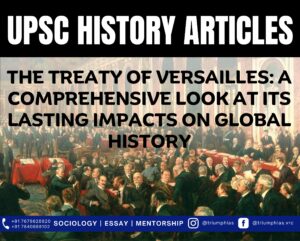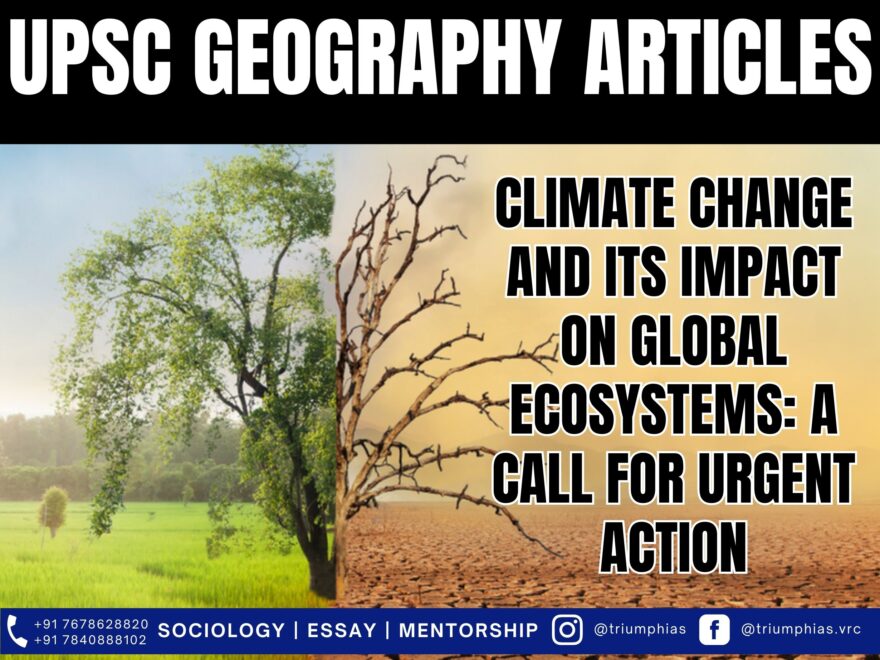Climate Change and Global Ecosystems
(Relevant for Geography Section of General Studies Paper Prelims/Mains)

Climate Change and Global Ecosystems
Climate change encompasses enduring alterations in temperature, precipitation distributions, wind behaviours, and other elements of the Earth’s climate framework over extended periods. It presents substantial hurdles for both natural environments and human civilizations, demanding immediate responses.
- Climate change predominantly arises from human actions, notably the release of greenhouse gases (GHGs) and the process of deforestation.
- These GHGs ensnare heat within the Earth’s atmosphere, initiating the greenhouse effect and ultimately causing global warming.
- The ascending temperatures and shifts in precipitation patterns exert impacts on ecosystems and the diversity of life within them.
- The heightened frequency and intensity of extreme weather phenomena disrupt habitats, alter the distribution of species, and upset ecological equilibrium.
- The thawing of glaciers and polar ice caps poses threats to marine ecosystems while also contributing to the elevation of sea levels.
- Climate change disturbs agricultural systems, leading to diminished crop yields, food insecurity, and the loss of livelihoods among farming communities.
- Transformations in weather patterns impact the availability of water resources, culminating in water scarcity and conflicts over access.
- Mounting sea levels imperil coastal communities, compelling migrations, and heightening susceptibility to natural calamities.
Factors Contributing to Climate Change:
- The combustion of fossil fuels (such as coal, oil, and natural gas) results in the emission of carbon dioxide (CO2) into the atmosphere.
- GHG emissions stem from various sources, including industrial operations, transportation systems, and the process of deforestation.
- The removal of forests diminishes the Earth’s ability to take in CO2 through photosynthesis, consequently raising atmospheric CO2 levels.
- Swift industrial expansion and urban development result in elevated energy usage and heightened emissions.
- Within urban areas, the urban heat island effect intensifies local warming, compounding temperature increases in cities.
Measures to Mitigate Climate Change:
- Advocate for the adoption of renewable energy sources like solar, wind, and hydropower as a means to diminish dependence on fossil fuels.
- Promote the advancement of innovative technologies aimed at producing energy efficiently and with minimal environmental impact.
- Enforce sustainable approaches to forest management and champion reforestation initiatives to bolster the absorption of carbon. Foster the adoption of climate-resilient farming methods, agro forestry practices, and efficient water resource management.
- Encourage organic farming practices while reducing the utilization of synthetic fertilizers and pesticides.
- Reinforce global collaboration and support international agreements, including the Paris Agreement, to curtail GHG emissions and advance sustainable development.
Climate change poses substantial challenges to both ecosystems and human societies. By understanding its causes and implications, and implementing effective mitigation measures, we can work towards safeguarding the environment, ensuring sustainable development, and creating a resilient future for generations to come.
Sample Question for UPSC Sociology Optional Paper:
Question 1: How is climate change affecting human migrations and societal structures?
Answer: Climate change is leading to the displacement of communities, particularly those in coastal areas due to rising sea levels, causing migrations that heighten susceptibility to natural calamities and create social strains.
Question 2: What is the social impact of climate change-induced water scarcity?
Answer: Water scarcity due to climate change can lead to conflicts over access to water resources, aggravating social inequalities and contributing to social unrest.
Question 3: How does the urban heat island effect exacerbate the impacts of climate change in cities?
Answer: The urban heat island effect increases local temperatures in urban areas, intensifying the adverse impacts of climate change, such as heatwaves, which disproportionately affect vulnerable populations.
Question 4: What role can international agreements like the Paris Agreement play in mitigating the social consequences of climate change?
Answer: International agreements like the Paris Agreement can foster global collaboration to reduce greenhouse gas emissions and promote sustainable development, thereby mitigating the social impacts of climate change.
Question 5: How does climate change threaten the livelihoods of farming communities?
Answer: Climate change disrupts agricultural systems by altering weather patterns and precipitation, leading to diminished crop yields, food insecurity, and loss of livelihoods among farming communities.
Related Blogs …
 |
 |
To master these intricacies and fare well in the Sociology Optional Syllabus, aspiring sociologists might benefit from guidance by the Best Sociology Optional Teacher and participation in the Best Sociology Optional Coaching. These avenues provide comprehensive assistance, ensuring a solid understanding of sociology’s diverse methodologies and techniques.
Climate Change and Global Ecosystems, Climate Change, Global Ecosystems, Greenhouse Gas Emissions, Deforestation, Extreme Weather, Sea Level Rise, Renewable Energy, Sustainable Development, Food Insecurity, Water Scarcity

Choose The Best Sociology Optional Teacher for IAS Preparation?
At the beginning of the journey for Civil Services Examination preparation, many students face a pivotal decision – selecting their optional subject. Questions such as “which optional subject is the best?” and “which optional subject is the most scoring?” frequently come to mind. Choosing the right optional subject, like choosing the best sociology optional teacher, is a subjective yet vital step that requires a thoughtful decision based on facts. A misstep in this crucial decision can indeed prove disastrous.
Ever since the exam pattern was revamped in 2013, the UPSC has eliminated the need for a second optional subject. Now, candidates have to choose only one optional subject for the UPSC Mains, which has two papers of 250 marks each. One of the compelling choices for many has been the sociology optional. However, it’s strongly advised to decide on your optional subject for mains well ahead of time to get sufficient time to complete the syllabus. After all, most students score similarly in General Studies Papers; it’s the score in the optional subject & essay that contributes significantly to the final selection.
“A sound strategy does not rely solely on the popular
Opinion of toppers or famous YouTubers cum teachers.”
It requires understanding one’s ability, interest, and the relevance of the subject, not just for the exam but also for life in general. Hence, when selecting the best sociology teacher, one must consider the usefulness of sociology optional coaching in General Studies, Essay, and Personality Test.
The choice of the optional subject should be based on objective criteria, such as the nature, scope, and size of the syllabus, uniformity and stability in the question pattern, relevance of the syllabic content in daily life in society, and the availability of study material and guidance. For example, choosing the best sociology optional coaching can ensure access to top-quality study materials and experienced teachers. Always remember, the approach of the UPSC optional subject differs from your academic studies of subjects. Therefore, before settling for sociology optional, you need to analyze the syllabus, previous years’ pattern, subject requirements (be it ideal, visionary, numerical, conceptual theoretical), and your comfort level with the subject.
This decision marks a critical point in your UPSC – CSE journey, potentially determining your success in a career in IAS/Civil Services. Therefore, it’s crucial to choose wisely, whether it’s the optional subject or the best sociology optional teacher. Always base your decision on accurate facts, and never let your emotional biases guide your choices. After all, the search for the best sociology optional coaching is about finding the perfect fit for your unique academic needs and aspirations.
To master these intricacies and fare well in the Sociology Optional Syllabus, aspiring sociologists might benefit from guidance by the Best Sociology Optional Teacher and participation in the Best Sociology Optional Coaching. These avenues provide comprehensive assistance, ensuring a solid understanding of sociology’s diverse methodologies and techniques. Sociology, Social theory, Best Sociology Optional Teacher, Best Sociology Optional Coaching, Sociology Optional Syllabus.
Best Sociology Optional Teacher, Sociology Syllabus, Sociology Optional, Sociology Optional Coaching, Best Sociology Optional Coaching, Best Sociology Teacher, Sociology Course, Sociology Teacher, Sociology Foundation, Sociology Foundation Course, Sociology Optional UPSC, Sociology for IAS,
Follow us :
🔎 https://www.instagram.com/triumphias
🔎https://www.youtube.com/c/TriumphIAS
https://t.me/VikashRanjanSociology
Find More Blogs
|
Scope of the subject and comparison with other social sciences |
|||
|
|
|
|
Modernity and social changes in Europe |


2 comments